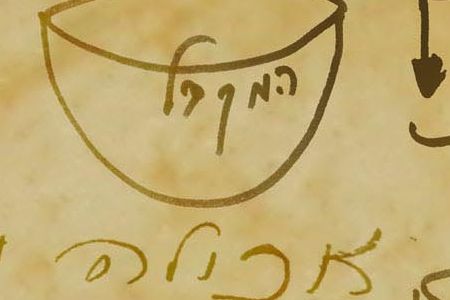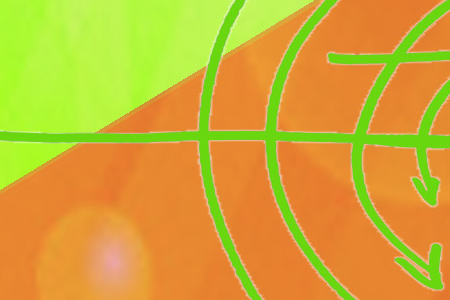
By realizing our purpose in life, we attain perfection, tranquility, unbounded enjoyment and the ability to transcend time and space while still living in this world. Everyone will reach this awareness, and there are two ways to reach it…
The wisdom of Kabbalah reminds us that human desires progress from simple desires, animal desires—for sex, for shelter, food, family—and when these are satified, we move on to a greater desire, a desire for wealth. When this desire for wealth feels empty, we move on to a desire for fame and/or power. Once we fill that, we are moved on by our emptiness into knowledge. And once we find knowledge empty, we find ourselves in a confusing situation in which nothing from this world can satisfy us. It is at that point at which a completely new level of development becomes accessible to us characterized by a radically different type of desire that will change everything within the human heart.
Up until this time the human heart (when we hear the term “heart” in Kabbalah, it means the sum total of all our desires) is still filled with desires that come from the physical world such as those discussed above. This radically different desire, which is a desire to reach the spiritual, is called “Israel”—from two Hebrew words, Yashar (straight), and El (God)—a desire for a direct connection with Creator, the quality of love and bestowal. The corporeal desires are called nations, the nations of the world, in other words, the desires of the physical world.
Up until this point, the force of development—by way of physical desires—happened unconsciously. But from now on it has to happen in consciously because this new desire, also known as the “point in the heart,” is a spiritual gene and it is like the embryo of the soul. The soul is a desire and it must be filled; the heart must be filled with this desire; it must fill everything despite these corporeal desires. In other words, all of the desires we have need to undergo a transformation, a correction. It is by correcting these desires that the desire to go directly to God can be fulfilled.
Why Does the Attainment of Spirituality Require a Correction of Our Desires?
In our original state, at the root of our soul, we were connected to the Creator as the Creator and the creature. And here, we were all adhered to the Creator as one being, as one unified creature. But because of the Thought of Creation, which is to create a creature and fill it with delight, that was only the starting point; it was the beginning of the system. The quality of the creature which is the will to receive, started to expand purposefully, and as a result of the expansion of this quality, of this desire to receive for myself alone, an ever increasing difference in quality started to grow between the quality of the Creator (which is bestowal), and the quality of the creature (which is reception).
As this egoistic intention expanded in the first creature, the collective soul called Adam ha Rishon (the first man) descended through a system of worlds, through 125 steps to greater and greater egoism until the soul reached a point in which it became separated into what appears to be physicality. That is, the collective soul was shattered into 600,000 parts, each one of these parts having a piece of the original; each one of these parts being a desire. This is only the half-way point of a process—this broken, shattered aspect of the collective soul in which we experience isolation and separation from each other, a kind of antagonism towards each other, and a desire to exploit each other. This is the half-way point and it is going to be corrected. It is going to rise back up through this system of worlds, back into this state of adhesion with the Creator but it can’t do it all at once. So purposefully, it was broken into 600,000 parts.
Each one of these parts was likewise broken down into 613 desires. That is, each individual desire within Adam ha Rishon consists of 613 desires that can be corrected; the parts are small enough. It’s like dividing a huge treasure and giving a coin to each person knowing that each one will return this quality of bestowal. This point in the heart that’s placed inside of a person can be trusted to bring that point back to its origin and put the treasure back together as a collective once again.
Thus, in the point in the heart of the individual who begins to feel this desire for spirituality, this coin from the treasure of the King, plus the 612 other desires that exist in the heart must be transformed bit by bit to resemble to a greater degree the quality of the Creator, to reverse this process.
2 Ways Correction Happens: Painfully or through Attainment
This process of the return to our source and correction (Tikkun), of fulfillment of the Thought of Creation, is going to happen, and all of us, all 600,000 pieces of the collective soul are going to rejoin, and are going to ascend from physical selfish perceptions in a world of suffering, back into a complete whole inter-relationship with each other. In this way we reach the goal of creation, which is adhesion to the Creator and the complete filling of the greatest unbounded desire. It’s going to happen.
But the question is, will it happen consciously, with our agreement, or will we be pushed to it? There is one goal, which is assured, but there are two paths to the goal: One path involves going through the motions unaware of what is causing them, and how to use them optimally to realize life’s best state; the other path involves gaining awareness and insight into the cause and best possible way to relate to reality, and thus achieve the goal in the fastest and most pleasurable way possible.
If you’re interested in the wisdom of Kabbalah and everything it has to offer at a deeper level, we recommend starting with a beginner course in the fundamentals of Kabbalah. Courses are free, and there are self-study video classes available to start immediately, as well as a live course that starts on Wednesday, June 11, 2014. Sign Up For A Free Course Here »






